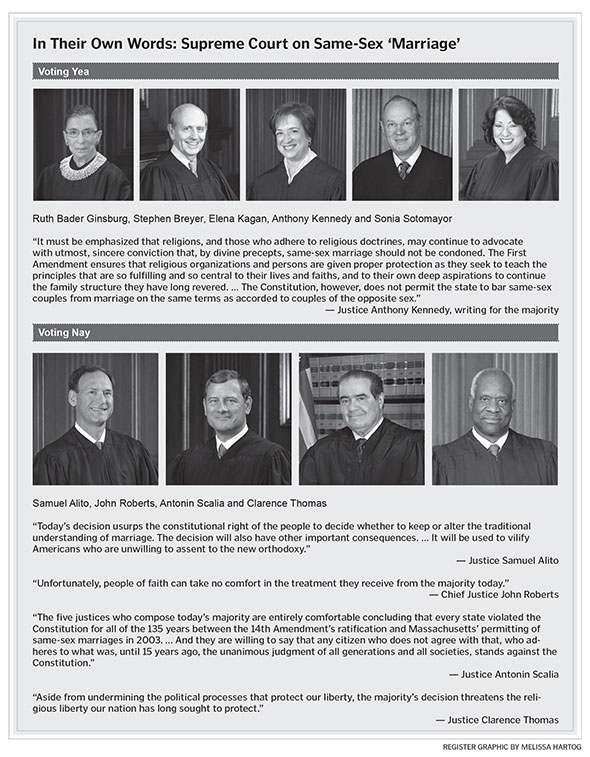America’s Marriage Moment
Church Leaders React With Dismay — and Resolve
WASHINGTON — in a long-awaited decision that will have sweeping and unpredictable consequences for U.S. jurisprudence, cultural norms and religious freedom, the U.S. Supreme Court ruled that same-sex “marriage” is a constitutional right.
“Under the Constitution, same-sex couples seek in marriage the same legal treatment as opposite-sex couples, and it would disparage their choices and diminish their personhood to deny them this right,” wrote Justice Anthony Kennedy, the author of the majority opinion, who was joined by Justices Ruth Bader Ginsburg, Stephen Breyer, Sonia Sotomayor and Elena Kagan.
“No longer may this liberty be denied.”
Issued on June 26, the ruling in Obergefell v. Hodges and three related cases, swept away 14 remaining state laws that effectively barred “marriage equality,” though it could take weeks for some states to comply.
Chief Justice John Roberts Jr., joined by Justices Antonin Scalia, Clarence Thomas and Samuel Alito Jr., rejected the majority’s legal reasoning, and each issued an opinion.
“The majority’s decision is an act of will, not legal judgment,” stated Roberts in his opinion. “The right it announces has no basis in the Constitution or this court’s precedent. The majority expressly disclaims judicial ‘caution’ and omits even a pretense of humility, openly relying on its desire to remake society.”
No such right to marriage could be found in the Constitution, Roberts concluded, and that reduced the majority’s argument to the belief “that marriage is desirable and petitioners desire it.”
The news drew praise from President Barack Obama, while GOP leaders called for legislation that would protect free-exercise rights for Americans who hold to a definition of marriage as a union of one man and one woman.
Catholic leaders, legal scholars and marriage experts reacted to the news with dismay. But they also expressed resolve that the decision would not discourage their efforts to preach and teach the truth about marriage and to advance respect for the institution as a union of one man and one woman committed to the care and education of children.
‘Not a Surprise’
“The Supreme Court’s 5-4 decision on marriage is not a surprise. The surprise will come as ordinary people begin to experience, firsthand and painfully, the impact of today’s action on everything they thought they knew about marriage, family life, our laws and our social institutions,” said Archbishop Charles Chaput of Philadelphia, in a statement marking the decision.
“The mistakes of the court change nothing about the nature of men and women and the truth of God’s word. The task now for believers is to form our own families even more deeply in the love of God and to rebuild a healthy marriage culture, one marriage at a time, from the debris of today’s decision.”
Archbishop Joseph Kurtz of Louisville, Ky., the president of the U.S. Conference of Catholic Bishops, equated the decision with the court’s controversial Roe v. Wade ruling that legalized abortion on demand. And he vowed that Church leaders would not abandon the truth about marriage.
“Jesus Christ, with great love, taught unambiguously that, from the beginning, marriage is the lifelong union of one man and one woman,” said Archbishop Kurtz, in a statement.
“As Catholic bishops, we follow Our Lord and will continue to teach and to act according to this truth.”
He said it was “profoundly immoral and unjust for the government to declare that two people of the same sex can constitute a marriage.”
In Case No. 14556, Obergefell v. Hodges, the U.S. Supreme Court was asked to decide the constitutionality of state laws that barred same-sex couples from legal marriage or did not recognize the marriages of such couples legally wed in other states.
“Marriage equality” advocates had filed suit against such laws, arguing that they violated the 14th Amendment, which guarantees due process and equal protection.
In his opinion, Kennedy concluded that legal precedent affirmed a broad right to liberty and thus paved the way for a decision that found “same-sex couples may exercise the right to marry.”
The majority opinion featured emotional and, at times, poetic language in its description of marriage and the dignity it bestows on spouses.
“Its dynamic allows two people to find a life that could not be found alone, for a marriage becomes greater than just the two persons,” Kennedy wrote. “Rising from the most basic human needs, marriage is essential to our most profound hopes and aspirations.”
But Scalia, in his dissent, attacked the decision as a bold example of judicial activism. “Today’s decree says that my ruler, and the ruler of 320 million Americans coast to coast, is a majority of the nine lawyers on the Supreme Court,” Scalia wrote.
Further, the dissenting justices were clearly frustrated with Kennedy’s ambiguous treatment of free-exercise rights.
Since last October, when the Supreme Court declined to hear appeals to rulings that overturned bans on same-sex “marriage” in five states, Church leaders, legal experts and marriage activists understood that the high court was poised to issue a definitive judgment. Subsequently, a number of appellate courts quickly moved to embrace the new definition of marriage, boosting the number of states that legalized the practice from 19 to 24, with the number of states at 36 when the June 26 ruling was issued.
During the past eight months, U.S. bishops and religious-freedom scholars expressed alarm that an imminent decision by the court might ignore free-exercise conflicts posed by “marriage equality.”
Then, in April, during the oral arguments for the four marriage cases, U.S. Solicitor General Donald Verrilli Jr. acknowledged that religious schools that oppose same-sex civil unions might face “an issue” with their tax-exempt status, among other problems.
Stay Vigilant
In a June 26 interview with the Register, Archbishop William Lori, the U.S. bishops’ point man on religious freedom, said it was still too soon to judge how the ruling would likely affect free-exercise rights, though he took note of Verrilli’s remarks in the oral arguments and said Catholics must stay “vigilant.”
“My sense is that the majority opinion written by Justice Kennedy recognizes the right of religious institutions and people to teach and advocate — that is free speech,” said Archbishop Lori.
“But it does not recognize the right to free exercise — that is to say, to advocate in the public square, to try to affect public policy, to organize our ministries according to our teaching, or for business people to run their businesses according to that teaching.
“I did not see anything approaching [support for] free exercise in the majority opinion, but I did see it in Chief Justice Roberts’ dissent.”
Archbishop Lori said there is reason to worry that the ruling could result in Catholic educational institutions losing their tax-exempt status.
But he was cautious about addressing a second issue that arose during the oral arguments — whether Catholic priests and deacons would be able to solemnize marriages in the eyes of the law.
“With regard to the civil effect of religious marriages, that is a matter not yet decided by anyone. It is too early,” he said.
Gerard Bradley, a constitutional scholar at the University of Notre Dame Law School, described Kennedy’s murky treatment of free-exercise rights as “catastrophic.”
Explained Bradley: “Kennedy speaks explicitly of those ‘who adhere to religious doctrines’ and thus oppose same-sex marriage ‘by divine precepts.’ He says that the First Amendment ‘ensures’ ‘proper protection’ for these folks and even for ‘religious organizations.’”
However, Bradley pointed out that, throughout this portion of his opinion, one can hear Kennedy predicate this protection of advocacy, teaching, engaging with those who disagree and believers’ “‘own deep aspirations to continue the family structure they have long revered.’”
In contrast, Bradley applauded Roberts’ critique of the majority’s failure to properly engage free-exercise rights.
“The majority graciously suggests that religious believers may continue to ‘advocate’ and ‘teach’ their views of marriage,” Roberts noted. “The First Amendment guarantees, however, the freedom to ‘exercise’ religion. Ominously, that is not a word the majority uses.”
Judicial Activism
But concerns about free-exercise rights are not the only issue for opponents of the court’s ruling. Many critics attacked the court for intervening in a critical national debate that was not yet resolved.
Indeed, in oral arguments for the four cases, Breyer acknowledged persistent questions about whether nine justices should decide this question, rather than the people’s elected representatives in Congress or at the state level.
In his opinion, Roberts signaled that the court had overstepped its role.
“If you are among the many Americans — of whatever sexual orientation — who favor expanding same-sex marriage, by all means celebrate today’s decision,” he stated. “But do not celebrate the Constitution. It had nothing to do with it.”
Opponents of same-sex “marriage” applauded Roberts’ restraint, but were angered that a majority of the justices imposed their beliefs regarding marriage on the nation.
“The left has been preparing the culture for this ruling for years, evangelizing its own gospel of sexual freedom from the constraints of the Judeo-Christian understanding of sexuality and marriage,” Benjamin Wiker, an associate professor of political science at Franciscan University, told the Register.
“With the Supreme Court’s ruling, gay marriage has become the new abortion, yet another moral issue that remains unresolvable as long as Christians put up moral, cultural and legal resistance.”
In recent years, support for “marriage equality” has emerged as a key Democratic policy position, just as legal abortion has been for decades. But commentators also pointed to the influence of generational cultural trends that cross party boundaries and mark a clear break with Christian sexual ethics.
“The majority opinion defines freedom as anyone’s right to define and express his identity. That is the ‘religion of me,’” R.R. “Rusty” Reno, the editor of First Things, told the Register. “This decision reflects the sad fact that this ‘religion of me’ has become our national religion.”
On the website of National Review, David French took note of the striking emotional language that pervaded Kennedy’s opinion.
“This isn’t constitutional law; it’s theology — a secular theology of self-actualization — crafted in such a way that its adherents will no doubt ask, ‘What decent person can disagree?’” wrote French.
Confused Values
Legal experts who had argued against such a decision expressed frustration that the court embraced the confused values of this era.
Ryan Anderson, a fellow at the Heritage Foundation and a leading voice on marriage, who has debated the issue at universities and on television, said the fight to defend marriage as a union of one man and one woman must continue in every forum available.
“We must work to restore the constitutional authority of citizens and their elected officials to make marriage policy that reflects the truth about marriage,” said Anderson.
“We the people must explain what marriage is, why marriage matters and why redefining marriage is bad for society,” said the scholar in a statement.
Like the U.S. bishops, Anderson has warned that the inclusion of same-sex couples in legal marriage would result in the redefinition of a central social institution, already weakened by no-fault divorce, fatherless homes and declining marriage rates among younger Americans.
In his majority opinion, Justice Kennedy rejected this argument.
“The limitation of marriage to opposite-sex couples may long have seemed natural and just, but its inconsistency with the central meaning of the fundamental right to marry is now manifest,” stated Kennedy.
Anderson countered: “Manifest to five unelected judges that is. Not to the majority of American citizens, who voted to define marriage correctly.”
Weighing the Impact
Meanwhile, the Ruth Institute, which addresses the impact of the sexual revolution on women and familiies, warned that the ruling shifted the issue of same-sex “marriage” from a matter of public debate to a constitutional mandate, with serious consequences for the rights of natural parents and their children.
“The Obergefell decision tacitly declares that invented rights of adults take precedence over natural rights of children,” said Jennifer Roback Morse, the Ruth Institute’s founder and president. “The policy of the United States government will henceforth be to take sides with ‘intended parents’ in disputes with natural parents and against the legitimate interests of children to their own genetic and cultural heritage.”
In the months and years ahead, the full impact of the court’s ruling will be understood, not only by legal and marriage experts and religious leaders, but by ordinary Americans.
For now, Catholic bishops, who have already been on the front lines of the marriage wars and the battle for religious freedom, expressed a calm resolve about staying the course.
During a June 26 press call, Archbishop Timothy Broglio of the Archdiocese for the Military Services agreed that Catholics could face penalties for their belief in marriage as a union of one man and one woman, but he reminded his audience that American Catholics had experienced marginalization in previous centuries, and they persevered.
In his interview with the Register, Archbishop Lori recalled the words of Jesus Christ: “Be not afraid.”
“We need to be serene; we need to be firmly rooted in our relationship with Christ and in the teaching of his Church,” said Archbishop Lori, who explained that during the Fortnight for Freedom, which ended July 4, he found inspiration in the courage and canniness of St. Thomas More.
“We have to be vigilant because we have already faced challenges in states where same-sex marriage exists,” he continued.
“We will have to ask ourselves, on a state-by-state basis, and even the level of municipalities: What is the right thing to do?
“We need to be as creative as we can be. We must make sure the rights of everyone are respected, not just the rights of some. We have a lot of hard work to do.”

- Keywords:
- July 12-25, 2015

















